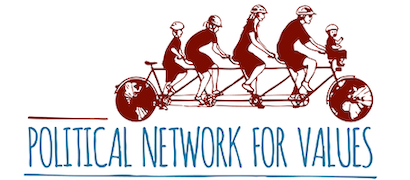
OUR VALUES
Decalogue of Commitments for Human Dignity and the Common Good
The dignity of the human person constitutes an ethical value of universal and transcultural character, not confined to a geographic or temporal scope, which manifests in the social realm as the foundation of the common good of humanity. That is why we stress the significance and meaning of the Universal Declaration of Human Rights of 1948.
As members of the Political Network for Values, we adopt the following ten points, agreeing that politics is a task at the service, defense and promotion of the dignity of the human person and the full development of their communities, both locally and globally.
1. Life is the first of all human rights, without which the other rights lose their foundation. It is therefore our duty to legally protect the right to life of every human being.
2. The defense of life should begin from its moment of conception, when the human being is most vulnerable and defenseless. The destruction of human embryos, cloning, genetic manipulation and surrogacy are practices that we must reject. Instead, research on adult stem cells should be promoted and prioritized, including research on adult stem cells reprogrammed back to an embryonic state and stem cells from amniotic fluid and the umbilical cord.
3. The family is the basic unit of society, the first school to build the character and values that shape the individual and prepare him or her to exercise a positive role in society. Thus, the defense of the family requires an unequivocal commitment on our part. The State must recognize the social and economic importance of marriage and the family; because of this, public policies with a family perspective should be promoted.
4. Marriage is an institution between a man and a woman in which each one makes a different and simultaneously complementary contribution to the process of family formation. It is therefore vital to promote this institution at the civic level and support it at the legal level.
5. It is the right of parents to decide the education of their children according to their moral, religious, philosophical and pedagogical convictions, which constitutes a central element to the defense of the dignity of the person. The State cannot and should not replace parents in this task.
6. Work is an essential element to the dignity of the person, since a person finds in work the opportunity to develop skills, earn a living, create a family heritage and contribute to the common good of society. Encouragement of fair and decent wages for all people within our society should always be a priority.
7. It is essential to emphasize the value of duties as an element that dignifies people. Relativism is an ideology that is driving our culture to demand more and to create false new rights that abolish duties, especially the duty of caring for the most vulnerable in our society, the elderly, children and unborn human beings.
8. Increased promotion and expansion of research and application of palliative care are essential. Euthanasia, like abortion, cannot be considered a right.
9. The defense of the right to conscientious objection in every sphere, especially in the field of health care, against the tyranny of relativism constitutes a demand and commitment we must make.
10. The defense of religious freedom is central to human dignity. One of the most outrageous manifestations of relativism we often suffer is the lack of reaction, even the indifference, of our society in the face of religious persecution around the world.
